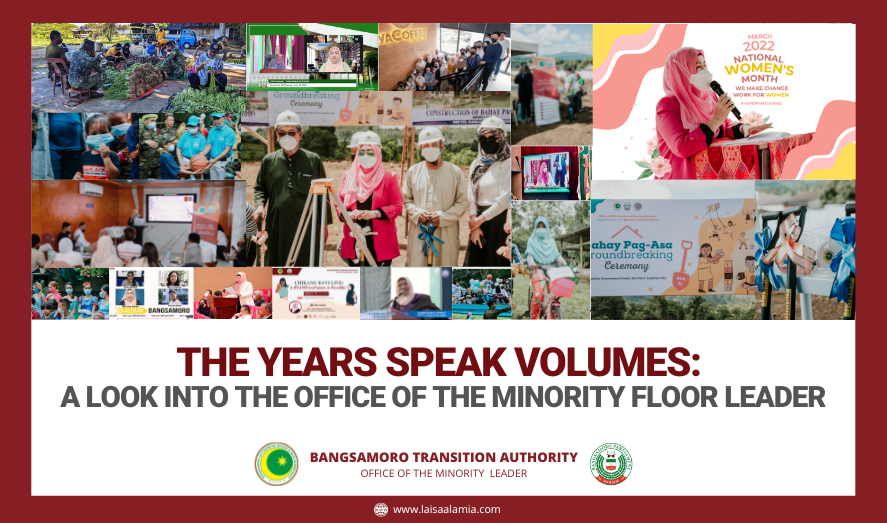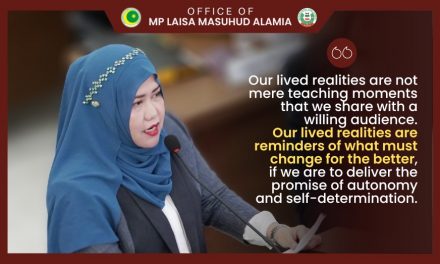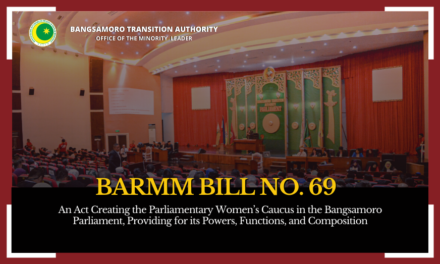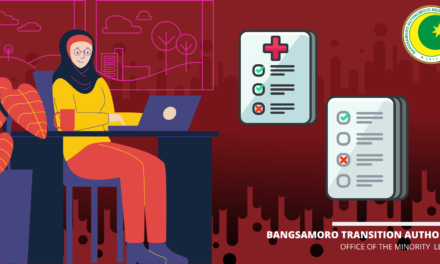While the first three years of the Bangsamoro Autonomous Region in Muslim Mindanao (BARMM)’s political transition has been challenging in the midst of a global pandemic, the Office of the Minority Floor Leader found its stride thanks to the decades of experience MP Atty. Laisa Alamia brought to the office. It advocated for transitional justice and reconciliation, women’s representation and political participation, and the rights of internally displaced persons, among other human rights concerns in the Bangsamoro region – a fitting continuation of MP Alamia’s long-standing track record as a public servant and people’s lawyer.
Here is a look into the policies and programs that the Office has pursued, as well as its engagements with stakeholders and partners working on a just and peaceful Bangsamoro.
Transitional justice and reconciliation essential to success of political transition
In an effort to push for legislation establishing and institutionalizing transitional justice and reconciliation (TJR) measures in the Bangsamoro Parliament, Minority Floor Leader MP Laisa Alamia filed a suite of five bills that highlights key elements of TJR, namely the people’s right to know, right to justice, right to reparations and the guarantee of non-recurrence.
Foremost among these bills is the Internally Displaced Persons Rights Bill which Alamia filed in October 2019, made all the more urgent by the absence of national legislation on IDP rights and the stalled Marawi Compensation Bill in Congress.
MP Alamia then filed three more TJR bills in October 2021, namely the Bangsamoro Armed Conflict Human Rights Violations Documentation Bill, the Bangsamoro Mujahideen/Mujahidat Benefits System Bill, and the Regional Transitional Justice and Reconciliation Commission for the Bangsamoro Bill.
“Pioneering a regional policy on internal displacement is a strong testament to our commitment in addressing the oft-ignored challenges that confront our people, as we work on establishing and sustaining just and lasting peace in the region,” Alamia said during her sponsorship speech for the IDP Rights Bill.
During her sponsorship speech for the legislative package on transitional justice in the Bangsamoro, she said that “all of us who stand here as members of the parliament owe this honor and privilege to the Bangsamoro revolutionaries and their communities that sustained our peoples’ movement in defense of our right to self-determination.”
Outside of the Parliament, she was a resource person in a committee hearing of the House Committee on Peace, Reconciliation, and Unity to discuss a proposed legislation on transitional justice at the national level, and helped facilitate a Transitional Justice Regional Training Camp for Bangsamoro Transition Authority and BARMM Officials. She also continues to work with a number of UN specialized agencies in designing policies and programs that are relevant and responsive to the needs of communities in the Bangsamoro.
Women engagement and political participation essential to genuine representation
As part of a push for better political participation among women, Minority Floor Leader Laisa Alamia filed the Women’s Caucus Bill in the Bangsamoro parliament in October 2020. Joining her as co-authors were all of her fellow women legislators in parliament, including Bangsamoro Women Commission Chair, MP Bainon Karon.
“Running for and surviving in [public] office has always been daunting for women, as we face discrimination and beliefs that tend to limit our societal roles,” Alamia says in the bill’s explanatory note. “With the need for a more equitable representation for women in Parliament, it becomes all the more important to nurture and encourage the presence of women in key decision-making spaces.”
A caucus gives women parliamentarians a venue to have meaningful conversations about policy and programs related to women’s issues, and consolidate ideas and opinions as they work on opening up spaces for women’s participation in various platforms across the region.
Through the caucus, women’s rights advocates and community leaders can also engage the women members of the parliament in pushing for legislation on gender rights and justice.
The women’s caucus, therefore, is a step towards building and strengthening genuine women’s solidarity and participation across the Bangsamoro region – a key ingredient in the success of the region’s political transition. It opens up a platform where women can bridge political divides, and mobilize political consensus in support of social justice and equality across the region.
Apart from this, MP Alamia consistently took part in programs and activities dedicated to the observance of women’s month and the 18-Day Campaign to End VAW, both at the regional and national levels. She continues to strongly against domestic violence, gender-based discrimination, and child marriages in the country,
A multi-sectoral approach to human rights in the Bangsamoro
MP Alamia has consistently worked with partners and allies across different sectors in ensuring that human rights is at the heart of moral governance in the BARMM. With years of experience in civil society and government, her approach to governance is characterized by consultation and collaboration that derives strength from a diversity of cultures and traditions.
Having established herself as one of the foremost advocates of women’s and children’s rights with years of experience in human rights work, MP Alamias has been invited by various organizations here and abroad to talk about the state of women’s and children’s rights, and the kind of support communities need in order to achieve gender justice and equality. Among these organizations are the United Nations Development Programme (UNDP), the UN Refugee Agency (UNHCR), the United Nations Population Fund – Philippines (UNFPA), Oxfam Pilipinas, and the International Development Law Organization (IDLO).
In the Bangsamoro, MP Alamia has worked closely on various issues and advocacies with the Consortium of Bangsamoro Civil Society, Inc. (CBCS), the Philippine Women Muslim Council (PWMC), the Institute for Autonomy and Governance (IAG), and Kalisa Action Network (KalisaAN), among others.
MP Alamia also discussed the future of representation for women, youth, and indigenous peoples in the BARMM government, in the fourth edition of ANC’s Bangsamoro and Beyond: A National Conversation. She noted how the Bangsamoro Parliament can amplify the voices of the marginalized and underrepresented in the parliament.
Recognizing the “lived realities of women, not just in the BARMM but in the entire country,” MP Alamia emphasized the value of “genuine and meaningful representation” in all levels of government. She stressed the need for public consultations where the Parliament can “engage the public and get their ideas and perspective about the future they want for the Bangsamoro.”








